 Petzlover
Petzlover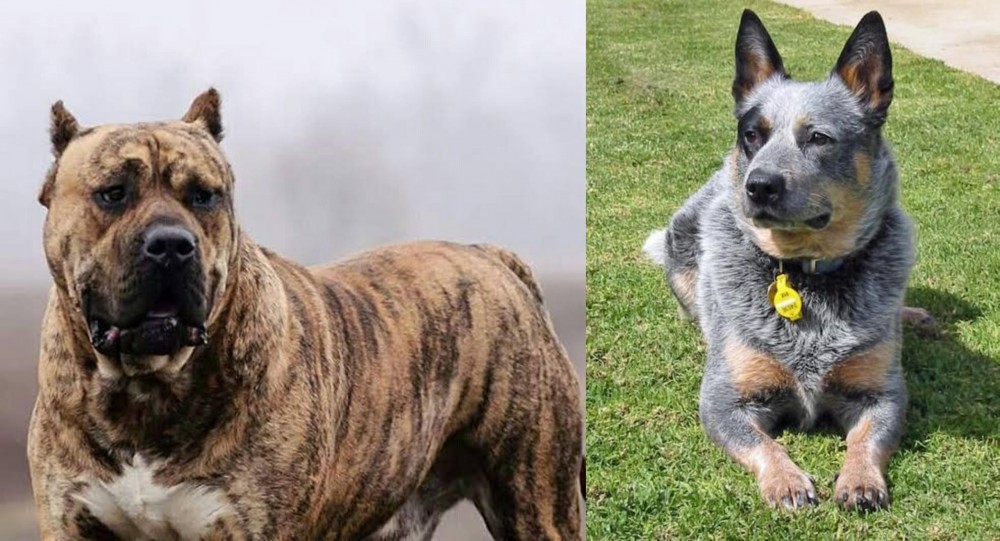 Perro de Presa Canario is originated from Spain but Queensland Heeler is originated from Australia. Perro de Presa Canario may grow 15 cm / 6 inches higher than Queensland Heeler. Perro de Presa Canario may weigh 48 kg / 106 pounds more than Queensland Heeler. Perro de Presa Canario may live 3 years less than Queensland Heeler. Perro de Presa Canario may have more litter size than Queensland Heeler. Both Perro de Presa Canario and Queensland Heeler requires Low Maintenance.
Perro de Presa Canario is originated from Spain but Queensland Heeler is originated from Australia. Perro de Presa Canario may grow 15 cm / 6 inches higher than Queensland Heeler. Perro de Presa Canario may weigh 48 kg / 106 pounds more than Queensland Heeler. Perro de Presa Canario may live 3 years less than Queensland Heeler. Perro de Presa Canario may have more litter size than Queensland Heeler. Both Perro de Presa Canario and Queensland Heeler requires Low Maintenance.
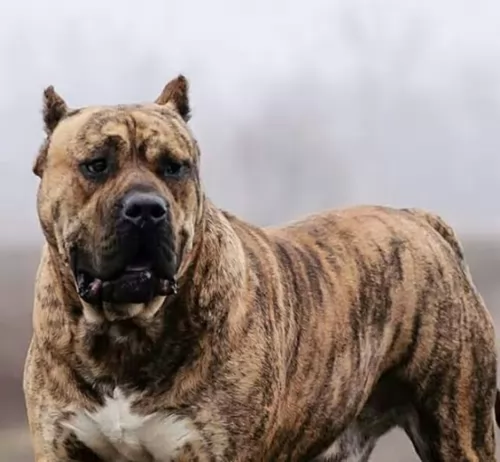 This large dog, also known as the Canary Mastiff, is a rare Molosser-type dog hailing from the Canary Islands.
This large dog, also known as the Canary Mastiff, is a rare Molosser-type dog hailing from the Canary Islands.
It does appear as if, according to records, that these dogs were also consumed at one time. The dog has also been used as a cattle dog as well as being used for dog fighting till the middle of the 1900s. Dog fighting was prohibited in the 1940s but it continued for a number of decades.
As people became interested in other dog breeds, the Presa nearly died out but some breeders revived the breed because of it having some good characteristics – territorial, brave, protective and intelligent. The FCI recognized the dog in 2011.
 Another name for Queensland Heeler is Australian Cattle Dog or Blue Heeler.
Another name for Queensland Heeler is Australian Cattle Dog or Blue Heeler.
These dogs have always been known for herding cattle. The term ‘Heeler’ comes from the dog’s working style – nipping and biting at the cattle’s hooves.
He was was an Australian cattle dog for Australian settlers in the 1800s. It is believed that Thomas Hall created one of the foundations of the Australian Cattle Dog breed by crossing crossing sheepdogs with Dingos.
The Blue-colored dogs have been the most popular, being known as the Blue Heeler.
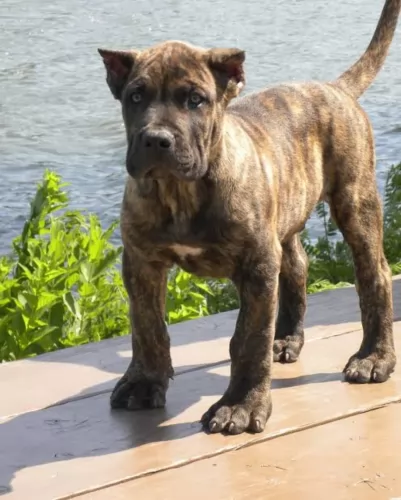 The Perro de Presa Canario or Canary Dog is large and muscular. He stands at 58 to 66cm in height and weighs anything from 40 – 70kg. He has a deep bark.
The Perro de Presa Canario or Canary Dog is large and muscular. He stands at 58 to 66cm in height and weighs anything from 40 – 70kg. He has a deep bark.
The head is broad and the ears are normally cropped to give him a more aggressive appearance. With ear cropping being banned the ears are close fitting to the head and are floppy. This is one of those dogs where the rear of the dog is slightly higher than the shoulders.
The coat is short and there is no undercoating. It is available in all different shades of fawn and brindle. The breed standard requires the dog having a black mask.
Canine experts tell us that this large working dog has got such fearless guardian characteristics that they wouldn’t recommend this dog for first time dog owners. On the other hand however, there are dog owners who claim that with good socialization, this dog becomes docile and amicable around their human family.
He is a clever dog so training and socialization will be easy and it will be worth it. This is a dog noted for its strength, it’s strong personality and potential for aggression, so training and socialization will be most important.
 The Queensland Heeler is a medium sized dog that stands between 43 and 51cm in height, both male and female. The dog weighs in the region of 15 to 22kg.
The Queensland Heeler is a medium sized dog that stands between 43 and 51cm in height, both male and female. The dog weighs in the region of 15 to 22kg.
He has a short double coat with colors being blue, mottled blue and also red speckled. You’ll also find black and tan coloring on this active dog.
He is strong, lean and muscular with medium sized ears that are erect. The eyes are dark and alert, the legs straight and strong. The tail can be docked or left long.
The Australian Cattle Dog is a high-energy working dog that you won’t easily find lying around. The alert eyes are consistently looking around for action and he can’t be bored otherwise he could resort to digging or other destructive behavior.
He is loving to his entire human family, but being particularly attached to just one family member. He is also protective, taking his guarding role of his family seriously.
He gets on well with children and other pets but you’ve just got to keep your eyes on him around children as when excited he can give a nip or two.
Training and socialization will be important for this dog, particularly because he can be strong-headed, willful and stubborn.
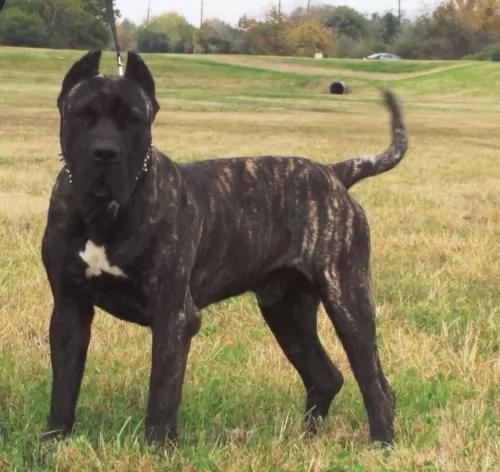 Contrary to what many people think, the Perro de Presa Canario can be a calm, gentle dog when trained and socialized properly.
Contrary to what many people think, the Perro de Presa Canario can be a calm, gentle dog when trained and socialized properly.
It is only when you bring an older, unknown dog into your midst that you would have to exercise caution with him as he can then be aggressive.
Dogs become dangerous and aggressive when they are brought up by aggressive, uncaring people. Humans are always to blame for the way a dog turns out. Provide this large dog with a loving, caring home, and he’ll show you what a remarkable pet he can be.
 Active, intelligent, feisty, brave, playful, loving – these are just some of the wonderful characteristics you get when you bring a Queensland Heeler into your home.
Active, intelligent, feisty, brave, playful, loving – these are just some of the wonderful characteristics you get when you bring a Queensland Heeler into your home.
True, he is independent, self-willed and stubborn, but training and socialization can take away all the rough edges.
He forms a strong bond with his human owner, and once you’ve had one of these amazing dogs in your life, you’ll be convinced that dogs are truly man’s best friend.
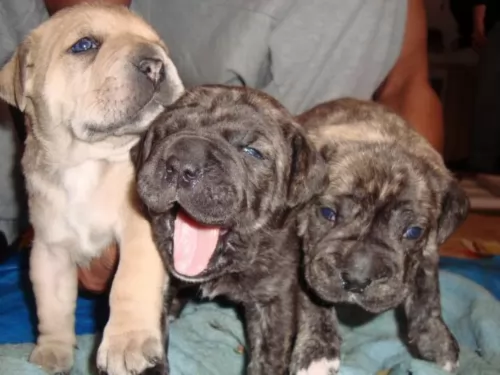 The Perro de Presa Canario can live to be between 8 and 12 years of age. Being a large breed the dog can be susceptible to hip dysplasia and other problems such as cancer and heart problems. It is highly unlikely that a well cared for dog will get any of these illnesses.
The Perro de Presa Canario can live to be between 8 and 12 years of age. Being a large breed the dog can be susceptible to hip dysplasia and other problems such as cancer and heart problems. It is highly unlikely that a well cared for dog will get any of these illnesses.
It is far better to give your dog two smaller meals a day as opposed to one bigger meal as then he tends to wolf his food down. This can lead to bloat, where the stomach swells up and worse, it twists. This dangerous situation prevents fluid and air from escaping the stomach. Your dog is restless, he paces and salivates, wanting to vomit. Bloat can affect any dog at any age.
Kidney disease can develop because of some other illness or it can develop on its own. It can even be caused by bad teeth when bacteria enters the bloodstream of the dog.
 Australian Cattle Dogs are healthy. Every dog, even the most healthiest breeds, can succumb to some of the common dog illnesses there are.
Australian Cattle Dogs are healthy. Every dog, even the most healthiest breeds, can succumb to some of the common dog illnesses there are.
This is an inherited condition, so if you’re looking for a puppy, be careful about the breeder you buy from.
This is another inherited condition where the thighbone of the dog doesn't fit properly into the hip joint. Your dog is usually so active but with this problem he may well be in pain and actually be lame. Your pet can even develop arthritis . The idea is to get your pet to the vet because it can be unbearable to see him in pain and unable to get around.
This eye disease can mean deterioration of the retina. You'll recognize the signs when you see your dog unable to navigate around your home during the night. He is night blind but later on he can’t see during the day either.
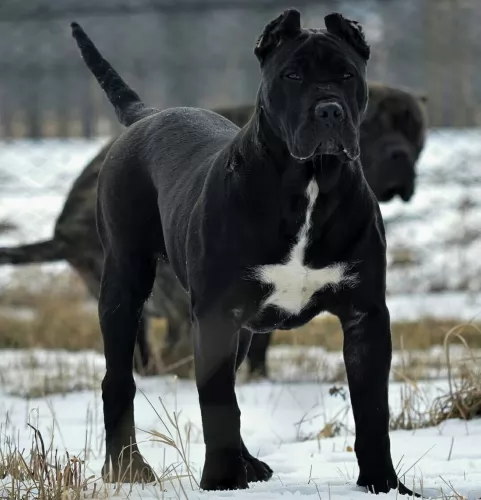 This is a short haired dog, and he isn't a heavy shedder so beyond regular twice-a-week brushing he will simply need to have his eyes and ears checked for infections.
This is a short haired dog, and he isn't a heavy shedder so beyond regular twice-a-week brushing he will simply need to have his eyes and ears checked for infections.
He will also need to have his nails clipped and to check his teeth over too. A sore, bad tooth at the back of your pet’s mouth can cause terrible pain but also play havoc with his general health.
Your Perro de Presa Canario is a high-energy dog and he will need daily exercise. He will love a good walk but he will also need something more strenuous and demanding such as ball- and rope tug-of-war games.
Try and provide your large pet with a top quality commercially manufactured food – one that is packed with vitamins and minerals instead of colorants preservatives and toxic fillers.
Break the monotony of feeding him only kibble by mixing in some cooked chicken, brown rice, sweet potato, carrots and spinach. Dogs love consistency and simplicity and simple meals like this with some raw meat thrown in occasionally will keep him healthy and happy. Never leave him without a constant supply of fresh, cool water.
 To cope with his life on the Australian Outback, the Queensland Heeler is known to be a low maintenance dog.
To cope with his life on the Australian Outback, the Queensland Heeler is known to be a low maintenance dog.
The thick coat does shed and it can get dusty so a good brush twice a week is all that is basically required for this dog. If his nails don’t wear down naturally, you will need to have them trimmed. As with every dog, you will need to give attention to his ears and teeth.
This is an extremely active dog. He is going to be needing both mental and physical stimulation to avoid boredom, after all he is used to an active lifestyle herding cattle. Hikes, swimming, running – you name it – he’ll join you with all your activities.
Your Queensland Heeler is such a vibrant dog, full of the joys of living, and you want to ensure he has good food to eat to ensure he stays like that.
For convenience you get some excellent commercially manufactured dog foods. Your Blue Heeler is such a wonderful companion dog that you want to spoil him a bit and give him some delicious home-made food too. Boiled chicken, brown rice or pasta and spinach, sweet potatoes and carrots are a healthy choice for your pet – plain and simple just like dogs love it. Chop it up and add it into the high quality dry kibble a couple of times a week.
Some raw meat added in from time to time will help his skin and coat remain healthy. Never leave him without a constant source of fresh, cool water.